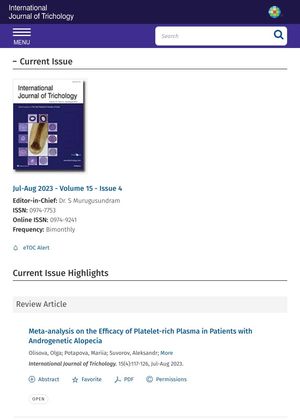Whisker Hair (Acquired Progressive Kinking of the Hair): An Indication for Finasteride 1 mg?
January 2016
in “
International Journal of Trichology
”

TLDR Taking 1 mg of finasteride daily could potentially treat rare hair conditions like Acquired Progressive Kinking of the Hair and whisker hair.
The document presents a case of a 23-year-old man suffering from Acquired Progressive Kinking of the Hair (APKH) and whisker hair, rare conditions that had fewer than 25 reported cases at the time. The patient's hair had turned darker, shorter, and curlier over three years, particularly around his ears and occipital area. The study suggests that patients with APKH and whisker hair have a higher risk of developing androgenetic alopecia. The document proposes finasteride 1 mg daily as a potential treatment for these patients, as it is considered an effective drug for preventing androgenetic alopecia.







